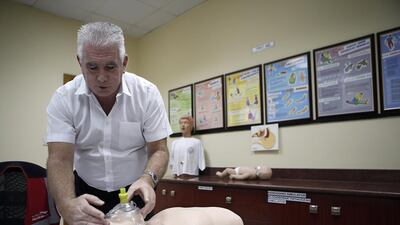Abu Dhabi Aviation’s chief safety trainer, Hank Jacobs, knows how vital rapid response to an emergency can be.
In 1991, as an air force search and rescue officer, he helped rescue all 571 passengers of the ship Oceanos, when it capsized off the coast of South Africa in a storm. “We pulled off every soul, even the ship’s dog off,” recalls the 55-year-old South African.
“Just like in the movies, a minute after we got everyone off, the ship sank. It taught me the importance of operational readiness – it’s all about quick response time.”
Timing is a key aspect of the first aid training Mr Jacobs now teaches from his dedicated classroom in Abu Dhabi Aviation’s safety training centre. For first aiders, the expert says that high- quality CPR and early defibrillating is now the main focus of the course
“The first aid courses people used to do, where you had to know all the names of the bones and pressure points in your body, isn’t really required any more. Now it’s mainly about timing,” says Mr Jacobs, who has been with Abu Dhabi Aviation for the past 11 years.
The training centre he oversees not only caters to Abu Dhabi Aviation staff but also private companies that want to up the skills of their employees. It’s quite a move for the Abu Dhabi Airport-based group, which operates 62 helicopters and four aircraft that carry passengers and cargo to and from the UAE’s oilfields.
In 1976, when the company launched with two helicopters and a wooden shed, health and safety training was a rather more remote concept. Now at least 150 people pass through its dedicated terminal every day, and the subject is part of the everyday vocabulary.
As well as first aid, Abu Dhabi Aviation offers eight-hour courses in fire safety, emergency oxygen and blood-borne pathogens.
“We’re expanding to teach health and safety, which the UAE Government is pushing to all duty holders,” Mr Jacobs says. “A lot of the ideology for these programmes comes from the UK, and then the civil aviation and the department of labour put in more restrictive requirements.
“Abu Dhabi Government will come into your company, look around and check you have firewall training and first aiders. These things take time to put in place, but don’t be caught without them. The UAE wants to set a high benchmark.” When the Government’s health and safety inspectors checked on Abu Dhabi Aviation’s own safety training centre recently, they were told that a dirty ceiling needed replacing and a carpet wasn’t up to scratch, says Mr Jacobs.
“We had to put in special counters and hot and cold water in our classroom, according to the requirements of what a clinic should be. But the authorities are very accommodating. They put in a lot of guidance and they give you extensions and help, so you’re not left alone.”
When it comes to safety, it is essential that instructions are understood, so training classes at the centre are small, with about six students.
“I try to make the training more practical than theoretical, because 62 per cent of the human brain is recognising from visual communication,” says Mr Jacobs, who adds that he is fortunate to have a general manager, Mohammed Ibrahim Al Mazrouei, who puts safety first.
“I feel sorry for those companies who have tighter budgets for safety. It’s essential in this industry because accidents could happen any time and any place.”
In a move to boost the health and safety of workers in the UAE, the Ministry of Human Resources and Emiratisation announced last July that from this year, all companies with 500 workers or more in the construction sector must have a UAE national health and safety officer on their facilities to be granted work permits.
Heat is a big health and safety issue in the UAE, and Abu Dhabi Aviation often conducts its own heat awareness programmes. Two years ago, Abu Dhabi had its highest recorded temperature of 51°, says Mr Jacobs, adding that the temperature is sometimes 10° higher on the asphalt. “For the engineers and refuellers who go out there in the summer the heat is a killer,” he says. “We have programmes in place for their safety.”
He cites the death of four-year-old Nizaha Aalaa in October 2014, who died after being left on a school bus. The school supervisor, the bus driver and the owner of the transport company were all jailed and fined. “We can start seeing how different people in an organisation, not only the CEO, can be held liable for unsafe provisions,” says Mr Jacobs.
For company stakeholders in Abu Dhabi who want more guidance, Mr Jacobs suggests doing the research themselves. He recommends the Abu Dhabi Emirate Environment, Health and Safety Management System book or the 1,200-page UAE Fire and Safety Code of Practice.
Meanwhile, Mr Jacobs’ team have now created their first fire warden training programme. “Each section of the workplace should now have a nominated fire warden, one for each floor, so they can evacuate their areas,” says Mr Jacob. “The excuse of ‘we’re busy so we can’t’ doesn’t stand. ”
business@thenational.ae
Follow The National's Business section on Twitter

